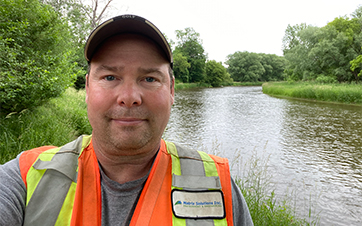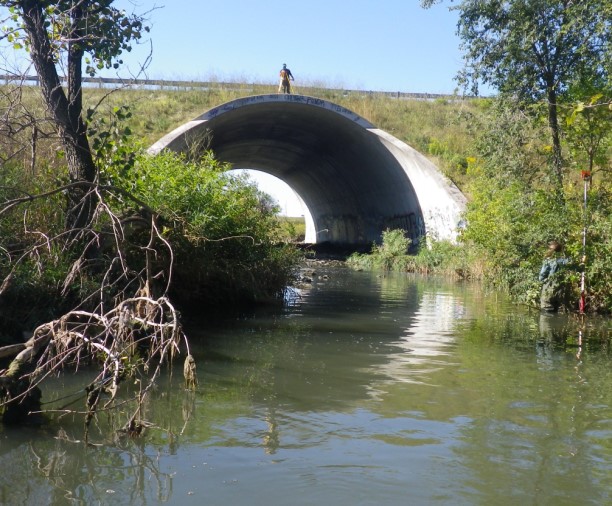 Chris Cummings (Senior Restoration Specialist) recently celebrated an exciting 25 year milestone with Matrix! We asked Chris to share some of his insights, lessons learned, advice, and greatest career achievements to date. Check out the full Q&A below. Congratulations Chris!
Chris Cummings (Senior Restoration Specialist) recently celebrated an exciting 25 year milestone with Matrix! We asked Chris to share some of his insights, lessons learned, advice, and greatest career achievements to date. Check out the full Q&A below. Congratulations Chris!
Why did you choose a career in natural channel design and restoration?
To be honest, I’m not sure I ever consciously chose this field. When I was young, I had a strong interest in the natural environment, especially streams, and that lead me to studying Fish and Wildlife at Sir Sandford Fleming College in hopes of being a wildlife biologist. Through that program, I completed a work placement with a conservation authority, which evolved into a student contract job collecting watercourse data for several multidisciplinary studies pertaining to stream assessment and management. Through that experience, I was introduced to the field of Fluvial Geomorphology and its application in understanding stream processes and habitat development. Twenty-five years later I’m still not a wildlife biologist, but I have been able to combine my education and practical work experiences into a unique career that combines my enjoyment of the natural environment with my problem-solving skills.
What aspects of your role do you find most rewarding?
While my role has evolved over the years, I have always enjoyed the hands-on and practical aspects of the job. Designing then supporting the building of channel restoration projects allows for a combination of creativity and the application of technical knowledge and experience. Seeing an idea take shape on the ground then watching it function as intended many years later never fails to remind me why this is a great field to be in. I also really enjoy the diversity of skills I have been able to develop and apply in my role with Matrix.
What advice would you give to someone pursuing a career in this field?
Specialization is not always your friend. Don’t be afraid to learn about peripheral disciplines. Seeing the bigger picture and understanding the full context of a problem will help you develop more successful solutions. In this field, knowing a little about a lot of things can really help make you more versatile, and by extension, more successful.
What is the career achievement that you are most proud of?
I would say there are two main things I’m proud of. The first is that I did not take a traditional path to where I am today and that gives me a great appreciation of what it takes to find a niche and create opportunities from hard work, perseverance, and a willingness to learn. The second is that I have been very privileged to have the opportunity to share my experiences with so many people at different points in their careers over these 25 years. Passing on the lessons I’ve learned (often the hard way) to others and seeing them successfully applied in the real world is a fulfilling part of my job.
What are the key factors that have led to the success you’ve had in your career?
Being versatile, never assuming I know all there is to know, and realizing that the person operating the excavator can have just as much to teach me as the person in the office with three degrees. By learning from other people’s experiences, you get much broader perspectives and that can save you a lot of hard lessons.
You’ve been with Matrix (previously Parish Geomorphic) for 25 years. What has been the best part about working for the company?
It’s very cliché, but the people. There are a lot of people I have worked with or for during this journey and so many of those people have helped mould me into the person I am today. They have made working in my role feel like a privilege and not a job. Now having a chance to give back and mentor the next generation of stream restoration professionals is both enjoyable and rewarding.
Learn more about our Stream Channel Assessment, Processes & Restoration expertise


